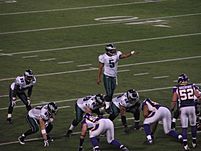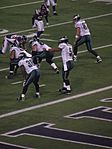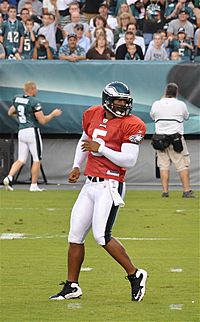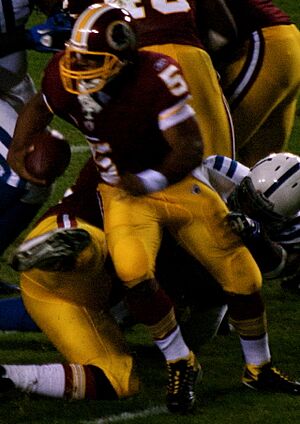Donovan McNabb facts for kids
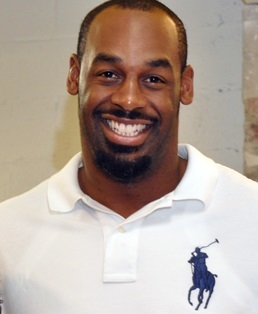
McNabb in 2010
|
|||||||||||||||||
| No. 5 | |||||||||||||||||
|---|---|---|---|---|---|---|---|---|---|---|---|---|---|---|---|---|---|
| Position: | Quarterback | ||||||||||||||||
| Personal information | |||||||||||||||||
| Born: | November 25, 1976 Chicago, Illinois, U.S. |
||||||||||||||||
| Height: | 6 ft 3 in (1.91 m) | ||||||||||||||||
| Weight: | 240 lb (109 kg) | ||||||||||||||||
| Career information | |||||||||||||||||
| High school: | Mount Carmel (Chicago, Illinois) |
||||||||||||||||
| College: | Syracuse (1994–1998) | ||||||||||||||||
| NFL Draft: | 1999 / Round: 1 / Pick: 2 | ||||||||||||||||
| Career history | |||||||||||||||||
|
|||||||||||||||||
| Career highlights and awards | |||||||||||||||||
|
|||||||||||||||||
| Career NFL statistics | |||||||||||||||||
|
|||||||||||||||||
| Player stats at PFR | |||||||||||||||||
Donovan Jamal McNabb (born November 25, 1976) is a former professional football quarterback. He played in the National Football League (NFL) for 13 seasons. Most of his career was with the Philadelphia Eagles.
McNabb played college football for the Syracuse Orange. The Eagles chose him as the second overall pick in the 1999 NFL draft. He played 11 seasons with the Eagles. Later, he played one year each for the Washington Redskins and Minnesota Vikings.
The Eagles honored McNabb by retiring his number 5 jersey. This happened when he was inducted into the Philadelphia Eagles Hall of Fame in 2013.
As the Eagles' starting quarterback from 1999 to 2009, McNabb led his team to many successes. They reached the playoffs eight times. This included five years in a row from 2000 to 2004. They also won five division titles and played in the NFC Championship Game four times in a row. McNabb led the team to nine wins in the postseason. He also led them to one Super Bowl appearance in Super Bowl XXXIX.
Many people consider McNabb one of the best quarterbacks in Philadelphia Eagles history. He was selected for six Pro Bowls. He was also named NFC Player of the Year twice by CBS Radio. McNabb was known for his "dual-threat" skills. This means he was good at both passing and running the ball. He was one of only a few quarterbacks to achieve over 30,000 passing yards, 200 touchdown passes, 3,000 rushing yards, and 20 rushing touchdowns. He holds several Eagles franchise records, including most passing yards and passing touchdowns.
Contents
Early Life and High School Football
Donovan McNabb was born and grew up in Chicago, Illinois. He went to Mount Carmel High School. As a sophomore, he played with future NFL players Simeon Rice and Matt Cushing. They helped Mount Carmel win the 1991 State Championship. In 1993, during his senior year, he led his team to a Chicago Prep Bowl championship. McNabb was also good at track and field. He played basketball with Antoine Walker.
College Football Career
Many colleges wanted McNabb to play for them. However, only Syracuse University and the University of Nebraska offered him scholarships to play quarterback. He chose Syracuse because he wanted to prove he could be a good "pocket passer." He also liked their broadcast journalism program.
Playing for Syracuse Orange
After taking a "redshirt" year in 1994 (meaning he practiced but didn't play in games), McNabb started every game for Syracuse. He had a great record of 35 wins and 14 losses. As a freshman, he threw the longest touchdown pass in Syracuse history. It was a 96-yard throw against West Virginia University. He was named the Big East Conference's Rookie of the Year.
In his junior year, McNabb set a school record with 2,892 total yards of offense. As a senior, he led Syracuse to the Orange Bowl against Florida. He completed 62.5% of his passes for 2,134 yards. He also ran for 438 yards and eight touchdowns. His 22 touchdown passes tied a school record. McNabb also played with future NFL star Marvin Harrison for one season at Syracuse.
College Achievements
McNabb was named the Big East's offensive player of the decade for the 1990s. He won the Big East Offensive Player of the Year award three times (1996–1998). He was also a first-team All-Big East player in all four of his seasons. In 1998, he was a finalist for the Heisman Trophy. Later, he was named to the Syracuse All-Century football team.
McNabb also played basketball for Syracuse for two seasons. He was a reserve player on the nationally ranked team. This included the 1996 team that lost in the National Championship game.
Professional Football Career
Joining the Philadelphia Eagles
The Eagles drafted McNabb as the second overall pick in the 1999 NFL draft. Some Eagles fans at the draft wanted the team to pick a different player. They even booed McNabb when he was chosen. However, McNabb proved them wrong. He was one of only two quarterbacks from that draft class who had a very successful NFL career.
McNabb played his first NFL regular-season game on September 19, 1999. He made his first start on November 14, leading the team to a 35–28 win. He was the first Eagles rookie quarterback to win his first NFL start since 1974. He threw his first touchdown pass on November 21, 1999.
Leading the Eagles: 2000–2003
In his first full season as a starter in 2000, McNabb was second in the MVP voting. He had his first 300-yard passing game in October. In November, he rushed for 125 yards, which was a lot for a quarterback. He led the Eagles to their first playoff appearance since 1996. They won their first playoff game against the Tampa Bay Buccaneers. McNabb was selected for his first Pro Bowl that year. He also broke club records for most pass attempts and completions.
In 2001, McNabb led the Eagles to an 11–5 season. He helped them win two games against the New York Giants with fourth-quarter comebacks. The Eagles won their first NFC East title in 13 years. They advanced to the NFC Championship for the first time since 1980. McNabb earned his second trip to the Pro Bowl. He signed a new contract with the Eagles worth $115 million over 12 years.
In 2002, McNabb was named NFC Offensive Player of the Month for September. He led the Eagles to a franchise record for points scored in four games. In November, McNabb broke his fibula during a game. He still finished the game with four touchdowns. He was the NFL's leader in total touchdowns per game. McNabb returned for the playoffs. The Eagles won against the Atlanta Falcons. However, they lost to the Tampa Bay Buccaneers in the NFC Championship.
In 2003, McNabb had a strong second half of the season. He led his team to the NFC Championship again. A famous moment was his "4th and 26" pass to Freddie Mitchell. This helped tie the game against the Green Bay Packers in the playoffs. McNabb also became the first quarterback to rush for over 100 yards in a postseason game. However, the Eagles lost the NFC Championship to the Carolina Panthers. McNabb played through a rib injury in that game.
Super Bowl XXXIX Season: 2004
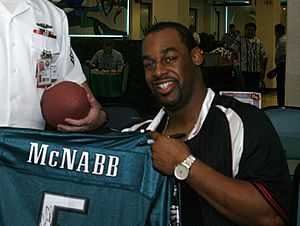
In 2004, McNabb had one of his best seasons. He completed 64% of his passes and threw 31 touchdown passes. He also ran for three more touchdowns. His passer rating was 104.7, which was an Eagles record. He became the first quarterback in NFL history to throw over 30 touchdowns and fewer than 10 interceptions in a season. This improvement happened with the arrival of star receiver Terrell Owens. The Eagles won their first seven games and finished with a 13–3 record.
McNabb had an amazing game against the Green Bay Packers. He completed his first 14 passes, setting an NFL record. He passed for 464 yards and five touchdowns in a big win.
In the playoffs, McNabb led the Eagles to their second Super Bowl appearance. They beat the Minnesota Vikings and the Atlanta Falcons. McNabb became only the third African-American quarterback to start in a Super Bowl.
The Eagles played against the New England Patriots in Super Bowl XXXIX. McNabb threw for 357 yards and three touchdowns. However, the Eagles lost 24–21. There were rumors about McNabb's health during the game, but he denied them. For his great season, McNabb was selected for his fifth straight Pro Bowl.
Dealing with Injuries: 2005–2007
McNabb's 2005 season started with some challenges, including team issues. Despite this, McNabb played well in September and was named NFC Offensive Player of the Month. He led the NFL in passing yards and touchdowns early in the season. However, McNabb suffered a sports hernia injury in November. This ended his season. He still led the NFL in total offense per game.
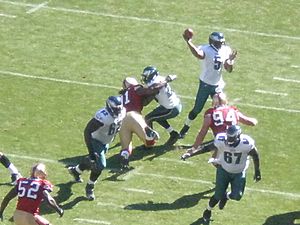
The Eagles started the 2006 season strong with McNabb. He led the NFL in several offensive categories. However, in November, McNabb tore a ligament in his right knee. This ended his season for the third time in five years. Backup quarterback Jeff Garcia took his place and led the Eagles to the playoffs.
McNabb returned for the 2007 season after recovering from his knee injury. In Week 3, he had a perfect quarterback rating against the Detroit Lions. He completed 21 of 26 passes for 381 yards and four touchdowns. Later in the season, he injured his ankle and missed two games. He finished the 2007 season with 3,324 passing yards and 19 touchdowns.
Playoff Push: 2008
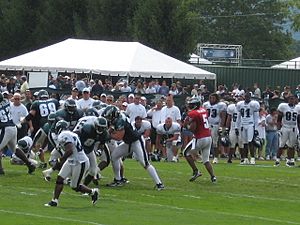
At the start of the 2008 NFL season, McNabb threw for 361 yards and three touchdowns in Week 1. In Week 3, he threw his 176th career touchdown, becoming the Eagles' all-time leader in touchdown passes.
McNabb was part of the NFL's first tie game in six years against the Cincinnati Bengals. He later said he didn't know an NFL game could end in a tie. After this, McNabb struggled in a game against the Baltimore Ravens. He was benched for the first time in his career for reasons other than injury.
Despite some ups and downs, McNabb helped the Eagles reach the playoffs for the seventh time. He set a career high with 3,916 passing yards. He also set a new NFL record for the lowest career interception percentage.
In the Wild Card Round, McNabb threw for 300 yards and a 71-yard touchdown. He led Philadelphia to a 26–14 win over the Minnesota Vikings. The Eagles then upset the New York Giants in the Divisional Round. They won 23–11 and advanced to the NFC Championship against the Arizona Cardinals. The Eagles came back from a big deficit but lost 32–25. McNabb threw for 375 yards and three touchdowns in that game.
Final Eagles Season: 2009
In the 2009 NFL draft, the Eagles picked wide receiver Jeremy Maclin. He joined DeSean Jackson to give McNabb more receiving targets. McNabb also encouraged the Eagles to sign quarterback Michael Vick as a backup. Vick had been released from prison for issues outside of football. McNabb was excited that the Eagles gave Vick a chance to restart his life.
In the season opener, McNabb led the Eagles to a 38–10 win. However, he broke a rib during the game. He missed the next two games. McNabb returned in Week 5 and played well. He reached 200 career touchdowns and 30,000 career passing yards in October.
The Eagles played the Dallas Cowboys in Week 17 for the NFC East championship. The Eagles lost this game and then lost to the Cowboys again in the Wild Card Round of the playoffs. This was the first time McNabb and the Eagles did not win a playoff game.
McNabb was selected for the Pro Bowl for the sixth and final time in his career. Many experts noted that McNabb achieved a lot with the Eagles, even though his team's most productive receivers were often running backs or tight ends.
Time with the Washington Redskins
On April 4, 2010, the Eagles traded McNabb to the Washington Redskins. In his first week with the Redskins, McNabb led them to a 13–7 victory over the Dallas Cowboys. In Week 2, he threw for 426 yards, one of his career highs.
In Week 4, McNabb played against the Eagles for the first time. He returned to Lincoln Financial Field in Philadelphia. The Redskins won 17–12. McNabb received a standing ovation from Eagles fans. He also hugged his former coach, Andy Reid, after the game.
In Week 5, McNabb led the Redskins to a 16–13 overtime victory against the Green Bay Packers. In November 2010, McNabb signed a five-year contract extension with the Redskins. However, the Redskins later lost badly to his former team, the Eagles. In December, head coach Mike Shanahan decided to have McNabb be the third-string quarterback for the rest of the season.
McNabb had one of his toughest years in 2010. However, he was on pace to break the Redskins' all-time franchise record for passing yards. He was ranked 100th among NFL players by his peers in 2011.
Playing for the Minnesota Vikings
On July 27, 2011, the Washington Redskins traded McNabb to the Minnesota Vikings. McNabb had been rumored to join the Vikings for a few years. This was partly because of his relationship with the Vikings' coach, Brad Childress, who used to be the Eagles' offensive coordinator.
After starting the 2011 season with a 1–5 record, the Vikings announced that McNabb would no longer be the starting quarterback. The job was given to rookie Christian Ponder. McNabb asked to be released from the team on December 1, 2011, and his request was granted.
On July 29, 2013, McNabb officially retired from professional football. He retired as a member of the Philadelphia Eagles.
NFL Career Records
NFL Records
- Most postseason wins by a quarterback whose teams did not win the Super Bowl: 9 (tied with Jim Kelly)
- Single season, most 40+ yard completions: 20
- Single game, most times sacked: 12 (tied with two others)
- Single game, highest passer rating: 158.3 (tied with many)
NFL Firsts
Donovan McNabb was the first quarterback with:
- A career interception percentage less than 2.1% and more than 4,000 career pass attempts.
- A career interception percentage less than 2.3% and more than 5,000 career pass attempts.
- A career total touchdowns per interception greater than 2.20 and more than 5,000 career pass attempts.
- More than 30 passing touchdowns and less than 10 interceptions in a season.
- More than 22 consecutive completions over a two-game span.
- More than 100 yards rushing in a postseason game.
- More than 100 yards rushing and more than 200 yards passing in a postseason game.
Philadelphia Eagles Franchise Records
Career
- Passing yards: 32,873
- Total offense yards (passing + rushing – sacks): 33,880
- Passing TDs: 216
- Total TDs: 244
- Completions: 2,801
- Attempts: 4,746
- Games played at quarterback: 148
- Games started at quarterback: 142
- Wins: 92
- Pro Bowls by quarterback: 6
- Pro Bowls by quarterback, consecutive: 5
- Games with 300+ yards passing: 30
- Games with 300+ yards total offense: 37
- Games with 3+ passing TDs: 29
- Games with 3+ total TDs: 38
- Games with 4+ passing TDs: 11
- Games with 4+ total TDs: 15
- Games with 5+ total TDs: 2 (tied with two others)
Season
- Most 300+ yard passing games: 5 (tied with three others)
- Most 4+ touchdown games: 5
Game
- Highest passer rating: 158.3 (tied with Nick Foles)
- Consecutive 300+ yard passing games: 3 (tied with four others)
Postseason
- Career passing yards: 3,752
- Career total offense yards (passing + rushing – sacks): 3,866
- Career passing TDs: 24
- Career total TDs: 28
- Career completions: 341
- Career attempts: 577
- Career interceptions: 17
- Career rushing yards by quarterback: 422
- Career sacks: 48
- Career sack yards: 308
- Wins: 9
- Conference championship appearances: 5
- Consecutive conference championship appearances: 4
- Games with 300+ yards passing: 2 (tied with Nick Foles)
- Games with 300+ yards total offense: 3
- Games with 3+ passing TDs: 2 (tied with Nick Foles)
- Games with 3+ total TDs: 4
- Single season, attempts: 121
- Single season, passing touchdowns: 7
- Single season, sacks: 12
- Single season, sack yards: 77
- Single game, most rushing yards by quarterback: 107
- Single game, completions: 30
- Single game, passing TDs: 3 (tied with three others)
- Single game, interceptions: 3 (tied with three others)
- Single game, sacks: 8
- Single game, sack yards: 49
Awards and Honors
NFL
- 2× CBS Radio NFC Player of the Year (2000, 2004)
- DC Touchdown Club NFC Player of the Year (2004)
- 101 Awards NFC Offensive Player of the Year (2004)
- 6× Pro Bowl selection (2000, 2001, 2002, 2003, 2004, 2009)
- 4× NFC Offensive Player of the Month
- September 2002; November 2003; September 2004; September 2005
- 16× Offensive Player of the Week
- 8× PFW NFL Offensive Player of the Week (2000 Week 13; 2001 Week 16; 2002 Week 11; 2004 Week 13; 2005 Week 2; 2006 Weeks 1 and 5; 2007 Week 3)
- 8× NFC Offensive Player of the Week (2000 Weeks 13 and 15; 2001 Divisional playoff; 2002 Week 3; 2003 Week 11 and Divisional playoff; 2004 Week 13 and Divisional playoff)
- NFL Top 100: 100th (2011)
- Philadelphia Eagles No. 5 retired
- Philadelphia Eagles 75th anniversary team
- Philadelphia Eagles Hall of Fame
- Philadelphia Sports Hall of Fame
- National Quarterback Club Hall of Fame
NCAA
- Big East Offensive Player of the Decade (1990s)
- 3× Big East Offensive Player of the Year (1996–1998)
- Big East Rookie of the Year (1995)
- 4× First-team All-Big East (1995–1998)
- Syracuse Football All-Century Team
- Syracuse Orange No. 5 retired
- Atlantic Coast Conference All-Time Football Honors
- Syracuse University, George Arents Pioneer Medal
Broadcasting Career
In September 2012, McNabb joined the NFL Network as an analyst. In 2013, he became an analyst on Fox Sports Live for Fox Sports 1. In August 2014, he provided commentary for a few NFL games on Fox. He left Fox in late 2015. In August 2016, McNabb became the lead analyst for beIN Sports college football coverage. He also joined ESPN Radio as an analyst. In September 2023, McNabb joined Outkick for a new show called The Five Spot With Donovan McNabb.
Personal Life and Family
McNabb married his college sweetheart, Raquel Ann Sarah "Roxie" Nurse, in June 2003. They have four children: a daughter named Alexis (born 2004), twins Sariah and Donovan Jr. (born 2008), and Devin James (born 2009). The family lives in both Moorestown, New Jersey and Chandler, Arizona.
In 2002, McNabb was named to the board of trustees at Syracuse University. He earned a Bachelor of Science degree in speech communication from Syracuse. McNabb is also involved with MODe Sports Nutrition as an athlete partner and advisor.
McNabb is the brother-in-law of former Canadian Football League (CFL) player Richard Nurse. Through this marriage, he is the uncle of several talented athletes. These include Canadian ice hockey defenceman Darnell Nurse (drafted by the Edmonton Oilers), professional basketball player Kia Nurse (for the Chicago Sky and Canada women's national basketball team), and Sarah Nurse, who plays for Team Canada's national women's hockey team.
Charity and Community Work
In 2000, McNabb started his own charity, the Donovan McNabb Fund. This charity works to raise awareness about diabetes. It has raised a lot of money for this cause.
In 2009, McNabb donated $2.5 million to help build a new neonatal intensive care unit (NICU). This unit is at the Virtua Voorhees Hospital in Voorhees, New Jersey. His family's four children were born at this hospital. The McNabb Family NICU has been helping patients since 2011.
In 2019, McNabb's wife, Raquel Nurse McNabb, co-founded the Caris Sports Foundation. This is a nonprofit organization that helps young people from disadvantaged backgrounds participate in sports. McNabb is a spokesperson for the foundation.
In 2021, McNabb also co-founded The QB Legacy (QBL). This nonprofit group mentors and coaches young quarterbacks. They work with middle school through college-aged players in communities that need more support. QBL camps teach football skills, leadership, and important life lessons.
See also
 In Spanish: Donovan McNabb para niños
In Spanish: Donovan McNabb para niños
- List of NFL quarterbacks who have posted a perfect passer rating
- List of Philadelphia Eagles first-round draft picks
 | Percy Lavon Julian |
 | Katherine Johnson |
 | George Washington Carver |
 | Annie Easley |


